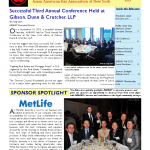
SERVICE IN THE OBAMA ADMINISTRATION
Many NAPABA members have expressed interest in serving in the second term of the Obama Administration. NAPABA has assembled the information below as an introduction to the process, and important information about how to facilitate pursuit of a position is included. Current NAPABA members should submit application materials as outlined below.
Career Versus Non-Career Positions
There are two ways to serve in the Administration: through a career position or through a non-career position. Career positions are civil service positions that have a traditional application process, while non-career or “political” positions are appointed by the president. Some non-career appointments require Senate confirmation while others will not, and there are often considerable delays involved in the Senate confirmation process.
Those who may be interested in career positions should search for vacancies using www.usajobs.gov, where all career civil service positions with the federal government are posted by the Office of Personnel Management. All applicants should follow the instructions contained in each posting of interest to them. Most career positions are not replaced during an administration change and interested individuals may apply for these jobs at any time.
How to Seek a Political Appointment
For those who may be interested in non-career positions, NAPABA strongly recommends that such members carefully and thoughtfully educate themselves about the available positions sought, their qualifications for such positions, and how they intend to navigate through the application, interview, and, if applicable, the Senate confirmation process. It is important to neither oversell nor undersell your qualifications in the process. A good starting point is to review the “Plum Book”, which is available online at http://www.gpo.gov/fdsys/pkg/GPO-PLUMBOOK-2008/content-detail.html, and is also available as an app here: http://m.gpo.gov/plumbook/. NAPABA members interested in non-career positions should also review the Council for Excellence in Government’s unofficial guide to selected presidential appointments, which is called the “Prune Book” and available online at www.excellenceintransition.org.
Applications that identify non-career positions of interest with the greatest degree of specificity possible (e.g., “Deputy U.S. Trade Representative, Office of the U.S. Trade Representative”) are more likely to reach the appropriate decision-makers in the Obama Administration, and to have greater success in the process. Conversely, applications that are not specific in the position sought (e.g. “I want to do something in trade.”) may be at a relative disadvantage in the process. There is no official list available of positions that are currently open or likely to become open. Interested parties should list the positions that they are interested regardless of the availability of this information.
Whether or not assistance from NAPABA is sought, everyone seeking a non-career position with the Obama Administration must visit and follow the application instructions posted on www.whitehouse.gov/blog_post/apply_for_a_job/. As with other competitive opportunities, NAPABA members pursuing positions in the next Administration – especially non-career positions – are highly encouraged to apply early and to promote their applications through all networks available to them, in addition to seeking any desired assistance from NAPABA.
Selection for career positions and appointments for non-career positions is an ongoing process that will continue year-round.
How NAPABA Can Help
NAPABA will try to answer members’ questions about service in the Obama-Biden Administration that were not addressed or not fully addressed by the information provided herein. Questions should be emailed to policy@napaba.org, using the subject line “POLITICAL APPOINTMENT APPLICATION QUESTION.”
NAPABA may be able to provide a limited number of current members with mentors who can directly answer questions about pursing political appointments and provide guidance about the appointment process. If you would like to request a mentor, please send an email to policy@napaba.org containing the subject line “POLITICAL APPOINTMENT APPLICATION–MENTOR REQUEST” and a brief description of your needs and why you believe that you would particularly benefit from mentorship. We will try to fulfill as many matches as possible and appropriate. To ensure an accurate mentor match, NAPABA requests that each NAPABA member seeking a mentor to have already reviewed the Plum Book, the Prune Book, and/or usajobs.gov and have narrowed his or her areas of interest based upon the information learned from the Plum Book, the Prune Book, and/or usajobs.com.
Where appropriate, NAPABA may try to facilitate an individual NAPABA member’s application for a position with the Obama Administration. Those interested in this type of assistance should submit their resumes and bios to policy@napaba.org using the subject line “POLITICAL APPOINTMENT APPLICATION MATERIALS.” Resumes and bios should be given filenames based on one’s last name, first name, and type of document. For example, a resume submitted by Pia Rivera would be saved as “Rivera Pia Resume” and her bio would be saved as “Rivera Pia Bio.” Please identify positions of interest using the greatest degree of specificity possible (e.g., “Deputy U.S. Trade Representative, Office of the U.S. Trade Representative”, “U.S. Attorney, San Francisco”). NAPABA’s direct efforts to facilitate any specific application may be subject to review and approval by the NAPABA board and/or Co-Chairs of the appropriate committees.
Note that although NAPABA may be able to support its members during this process, submitting materials to NAPABA is not an essential component of one’s application. All applications for career or non-career positions with the Obama-Biden Administration can be submitted using only www.usajobs.gov or www.whitehouse.gov, as described above.
NAPABA wishes the best of luck to all applicants!
 View this email in your browser January 11, 2013
View this email in your browser January 11, 2013







